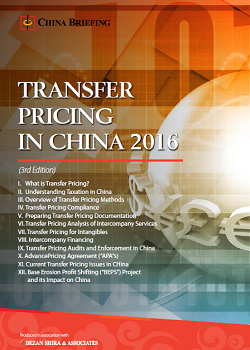Transfer Pricing in China 2016 – New Publication from China Briefing
Transfer Pricing in China 2016, the latest publication from China Briefing and Dezan Shira & Associates, is out now and available for purchase through the Asia Briefing Bookstore.
Transfer pricing is a reality for any multinational company. As a result of a globalized economy and increasing complexity in business models, tax authorities around the world are actively protecting their revenue base through the introduction of transfer pricing regimes, which focus on the taxation of profits that stem from related party transactions. These transfer pricing regimes will typically provide guidance to taxpayers on how related party transactions should be priced and how taxpayers can discharge the burden of proof that their transfer pricing arrangements comply with the arm’s length standard.
If designed and implemented early in a business life, a transfer pricing system can complement and support an MNC’s business model and commercial objectives, as well as optimize its global effective tax rate.
The Chinese tax authorities have embraced this growing trend of introducing transfer pricing regimes. In 2009, China formally introduced comprehensive transfer pricing regulations. Since then, China has also been a key player in the development of the United Nations Transfer Pricing Guidelines for Developing Countries, as well as the Organization of Economic Cooperation and Development (“OECD”)’s initiative and action plan on Base Erosion and Profit Shifting (“BEPS”).
Transfer Pricing in China 2016, written by Sowmya Varadharajan in collaboration with Dezan Shira & Associates and Asia Briefing, explains how transfer pricing functions in China. It examines the various transfer pricing methods that are available to foreign companies operating in the country, highlights key compliance issues, and details transfer pricing problems that arise from intercompany services, intercompany royalties and intercompany financing.
|
Asia Briefing Ltd. is a subsidiary of Dezan Shira & Associates. Dezan Shira is a specialist foreign direct investment practice, providing corporate establishment, business advisory, tax advisory and compliance, accounting, payroll, due diligence and financial review services to multinationals investing in China, Hong Kong, India, Vietnam, Singapore and the rest of ASEAN. For further information, please email china@dezshira.com or visit www.dezshira.com. Stay up to date with the latest business and investment trends in Asia by subscribing to our complimentary update service featuring news, commentary and regulatory insight. |

 Selling, Sourcing and E-Commerce in China 2016 (First Edition)
Selling, Sourcing and E-Commerce in China 2016 (First Edition)
This guide, produced in collaboration with the experts at Dezan Shira & Associates, provides a comprehensive analysis of all these aspects of commerce in China. It discusses how foreign companies can best go about sourcing products from China; how foreign retailers can set up operations on the ground to sell directly to the country’s massive consumer class; and finally details how foreign enterprises can access China’s lucrative yet ostensibly complex e-commerce market.
 Tax, Accounting, and Audit in China 2016
Tax, Accounting, and Audit in China 2016
This edition of Tax, Accounting, and Audit in China, updated for 2016, offers a comprehensive overview of the major taxes that foreign investors are likely to encounter when establishing or operating a business in China, as well as other tax-relevant obligations. This concise, detailed, yet pragmatic guide is ideal for CFOs, compliance officers and heads of accounting who must navigate the complex tax and accounting landscape in China in order to effectively manage and strategically plan their China-based operations.
 A Guide to China’s Free Trade Zones
A Guide to China’s Free Trade Zones
In this issue of China Briefing magazine, we examine China’s four Free Trade Zones and discuss the differences and strongpoints that exist in each of them. We begin by providing an introduction to the FTZs, and then take an in-depth look at the market access conditions, registration procedures and tax environments of each. Finally, we highlight some of the key considerations that foreign companies should be aware of when choosing an FTZ to invest in.
- Previous Article China’s New NGO Law: Navigating the Restrictions and Application Procedures
- Next Article Internet Censorship and China’s New Online Publication Law




























